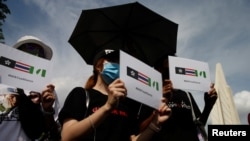A Twitter hashtag that surfaced in April as a clapback against Chinese nationalist attacks on a Thai celebrity for a perceived insult to Beijing is growing into a pan-Asian political movement.
Named after drinks associated with places struggling against increasingly authoritarian impulses — Hong Kong's milky black tea, Taiwan's bubble tea and Thailand's iced tea — the cyber-based Milk Tea Alliance, made up of like-minded netizens primarily from those regions, is beginning to gain traction in the real world.
While the group has endorsed myriad online campaigns, from Mekong River damming to censorship and the erosion of civil rights in Hong Kong, some observers say recent street demonstrations of historic proportions in Thailand are proof that online activism can translate into real-world action.
“At its heart, it united online proponents of civil liberties and self-determination, so it only makes sense that the alliance’s fire would turn not just on China but on authoritarians at home in Thailand,” said Gregory B. Poling, senior fellow for Southeast Asia and director of the Asia Maritime Transparency Initiative at the Center for Strategic and International Studies in Washington.
“As with most things that catch fire online, the #MilkTeaAlliance hashtag resonates because it is both clever and serves as a stand-in for the shared identity of a large community," he told VOA. "It was a tongue-in-cheek way for online communities in Thailand, Taiwan and Hong Kong to hit back at heavy-handed attempts by Chinese diplomats and netizens to censor online speech.”
Recent anti-government rallies in Bangkok saw demonstrators toting "#MilkTeaAlliance" signs alongside Thai national flags, the World Taiwanese Congress flags and Black Bauhinia flags used by pro-democracy demonstrators in Hong Kong.
Same 'opposition'
Milk Tea Alliance supporters from various countries showed support for dissolution of Thailand’s parliament, along with various constitutional amendments, by converging on the streets of Taiwan's capital, Taipei.
“[In] almost all the issues that we used the hashtag for, we have the same — not enemy, but opposition, which is China, and the dictatorship that is going on in Asia,” said Thachaporn Supparatanapinyo, a Taipei-based Thai national who studies in Taiwan.
Supparatanapinyo, who spoke at the Taipei rally in solidarity with pro-democracy movements in Thailand and Hong Kong, is associated with the nonprofit Taiwan Alliance for Thailand Democracy, which organized the event.
“This is the first physical expression of the Milk Tea Alliance,” Thai student Akrawat Siripattanachok, 27, told Reuters. “We don’t want to just talk about it online. We want a pan-Asian alliance for democracy.”
According to Reuters, Chinese Foreign Ministry spokesman Zhao Lijian was dismissive of the group's political significance.
“People who are pro-Hong Kong independence or pro-Taiwan independence often collude online. This is nothing new," he was quoted as telling Reuters. "Their conspiracy will never succeed.”
Unlikely origins
Founded on Twitter in April, the #MilkTeaAlliance hashtag was first used in response to Chinese microbloggers who trolled Thai celebrity Vachirawit "Bright" Chivaaree for retweeting a set of images that identified Hong Kong as a country. In response, netizens in Thailand, Hong Kong and other places began using the hashtag to show their regional breadth and numbers.
Taiwan-based Singaporean activist Roy Ngerng said the group's jovial take on serious topics and casual approach to creating online content resonates with young, savvy social media users across the region.
Humor 'very powerful'
“Humor is a very powerful tool that has been used to delegitimize our authoritarian regimes," Ngerng, a U.N.-recognized human rights defender, told VOA by email. "We are able to laugh off their threat, thereby weakening their perceived sense of strength for oppression.”
What started as a lighthearted and quirky reference to a shared affection for tea has snowballed into a political force that can leverage specific issues.
One recent campaign: China’s upstream damming of the Mekong River. With water levels in the lower Mekong basin at record lows, the Mekong River Commission recently issued two reports indicating China's damming of the Lancang tributary is exacerbating ecological imbalances, reducing household fishing hauls and imperiling a critical food source for tens of millions of people across Southeast Asia.
James Buchanan, a City University of Hong Kong doctoral candidate, told VOA: "Issues like the dams on Mekong River show an uneasiness with China's more expansive and assertive role in the region, where it is sometimes perceived as bullying its smaller neighbors. In fact, that's increasingly becoming China's image globally."
“The Mekong River is one of the most obvious issues on which China disregards the interests of its neighbors and uses disinformation and nontransparency to hide its actions," said Poling of CSIS. "It is almost tailor-made to outrage those in Thailand, and their like-minded peers abroad, who identify with the #MilkTeaAlliance community.”
In response to the severe consequences for China’s damming activities in the region, U.S. Secretary of State Mike Pompeo tweeted:
The U.S. supports the Mekong River Commission's call for transparency in dam operations on the Mekong River. The People’s Republic of China's massive dams are manipulating flows in a non-transparent manner that harms Mekong countries. https://t.co/kFVs1r4soZ
— Secretary Pompeo (@SecPompeo) August 14, 2020
With Milk Tea Alliance help online, a petition to the White House calling for China to stop damming on the Mekong River collected almost 100,000 signatures.
This story originated in VOA's Mandarin service. Some information is from Reuters.




